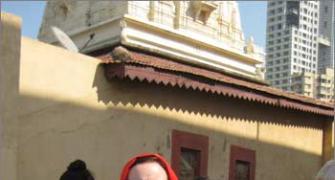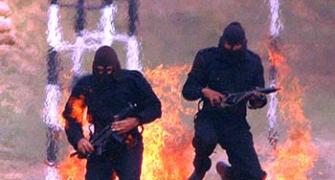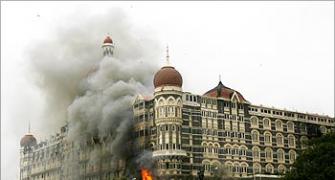 Milind Deora was the member of Parliament from Mumbai South when landmarks in his constituency like the Chhatrapati Shivaji Terminus, Hotel Taj Mahal and Hote Trident saw the deadliest terror attack on Indian soil. A few months later, he won the election with a huge margin. That he was present at the scene of tragedy throughout the 60-odd hours and the fact that he was at least seen to be doing something in the immediate aftermath, surely contributed to his win.
Milind Deora was the member of Parliament from Mumbai South when landmarks in his constituency like the Chhatrapati Shivaji Terminus, Hotel Taj Mahal and Hote Trident saw the deadliest terror attack on Indian soil. A few months later, he won the election with a huge margin. That he was present at the scene of tragedy throughout the 60-odd hours and the fact that he was at least seen to be doing something in the immediate aftermath, surely contributed to his win.
How safe do you think Mumbai is safe a year after the attacks?
India is much safer. Within a year, many systems and processes have improved, both at the central and state levels. But that does not mean there is no scope for improvement.
There have been major initiatives such as bringing in the National Security Guard hubs to various cities. Maharashtra has also raised an elite team called Force One. The Centre has also launched the historic National Investigative Agency, which will centralise intelligence gathering and analysis. There is much more coordination between the Indian Navy and the other agencies.
But there is room for much more to be done.
India, in its fight against terror, besides the homegrown threat of Naxalism, has to look mainly at cross-border terror. In this regard, India has a geographical problem.
People compared 26/11 to 9/11. In case of the United States, its neighbours are Canada and Mexico, with whom they share cordial relations. However, India's neighbours, on the other hand, are Pakistan, China, Bangladesh, Nepal and Sri Lanka -- many of who are not on the best terms with India and who would like to see India attacked.
We will have to work to prevent terrorism, but the reality is that we will be encountering problems along the way. In case something happens, how do we deal with it? There is room for improvement.
Which areas do you think need improvement? What precisely do we lack in terms of prevention and response?
We definitely need to improve our emergency medical services in several cities. Not that the government hospitals in Mumbai didn't do a good job, but we do need better emergency services, a world-class emergency medical response.
We also have to keep up a consistent level of pressure on our neighbours -- to not break them, as that may not be in our best interest, but to ensure accountability. That has to be done through the diplomatic course.
The average citizen and the private sector have a lot more to do. In the US, when they there were frequent shooting incidents among school students, the schools did a lot to ensure that children did not bring guns to school.
Are you saying that private establishments and common people should get involved?
Of course they have to be responsible. The police can't be everywhere. However, there has been an argument saying why should the people get involved in these things?
Yes, that would be the spontaneous reaction
But in that case, why should we have the police anywhere?
Let's narrow it down further to Mumbai. Has anything improved at all?
Here is the deal. To a large extent, cross-border terror will have to be dealt through foreign policy.
The role the central government plays is much greater than that of a local government. There were demands that the police must get better equipment and better arms. But we also need to make changes in regard to medical emergencies, both at government and private hospitals.
You are a Congress MP. The Congress rules the state and at the Centre. Is it fair to say not much has been done?
I won't say not much has been done, I would say more needs to be done. But I am an MP for the people of my constituency, not just a party. My duty is to say what is true.
I managed to get funds to the tune of Rs 120 crore for hospitals like JJ. The government definitely needs to do more. Especially in the area of medicine.
These health measures must be taken not just in case of a terrorist attack, but in case of any health emergency -- a swine flu outbreak too.
I think raising the elite commando units and establishing the hubs was a positive move.
But it is still a problem to create a robust medical infrastructure in the city that will respond in a timely and adequate manner. This should be taken up on a war footing.
What have you done as an MP since the attacks?
I was the first person who initiated the debate -- I demanded that the NSG hubs be set up all over India. I am glad that was heard. The first NSG hub outside Chandigarh was set up in Mumbai.
I also pushed the state government to create its own commando force.
That is one of the big steps we have taken. This will go a long way in combating terror and other problems.
A lot was expected out of your speech in the Parliament. But it came as a bit of disappointment
I don't think I make speeches in Parliament to please people with my rhetoric or oratory. I believe in action. So, if people say my speech was not great, may be I am not a good speaker. I am not interested in giving sound bytes or looking good on television. I am not a film star.
I made a speech and I raised certain issues. A lot of it was delivered. The government heard my voice and implemented it. That is far more important than what someone thought about my speech.
But Force One is not yet operationally ready.
I can't take ownership for setting it up. I am an elected representative, my job is to raise my voice and keep the heat up.
But did you know that it was not fully operational? That the boots are still not ready to hit the ground?
The NSG hub did happen in record time. We shouldn't rush into these things like a knee-jerk reaction. I won't rush something so that I can give sound bytes or an interview saying this was done.
In the area of human resources and manpower, especially when it is a highly skilled force, it is not a good idea to compromise on quality and time.
You had said last year that you were the only politician who was present at the site of the attacks and that you would have gone even if you hadn't been an MP. What made you want to go there?
I identified with the helplessness and frustration that the people were going through. I too wanted to be part of that unified voice.
There was considerable anger then
Anger is a good thing. I was all for that. I was ready to take a political risk. Politically, I should not have gone. I am from the ruling party.
But it was important for me to be with the people. I too felt the same way. That is why I had gone.
But I found many people were being regressive. Anger is a good thing, I welcome it. But comments like 'We don't want democracy' were immature at that time.
I thought of my friends in Pakistan who always say that we in India are lucky because we are a democratic nation.
What bothered me further is the huge disconnect between the people and the government. People must understand that the government is from the people.
Milind Deora didn't parachute on the people. I am an MP for two terms because the people elected me. People must engage effectively and constructively with the representatives. We are not different.
While people criticised politicians severely, the voter turnout in the elections was abysmal. What would you say about this, as a politician?
Why only as a politician, as an individual too this is a problem. It is unfortunate. I think when we say Mumbai had a bad turnout, we need to remember that a section of the society -- the armchair critics -- like to say things are bad. They are the ones who unfortunately don't go out and vote.
If all those at Gateway candlelight vigil had come out and voted, the turnout would have been far higher.
It is also largely got to do with economics. The middle class and the lower middle class vote more than upper class. The turnout at Opera house is three times more than Peddar Road or Altamont Road -- they are the ones who love to criticise a party over a drink. There are the ones who have an elitist attitude not to vote and participate in active democracy.
I find a lot of youngsters who are conscious and aware of politics. But there also those who don't even know the ABCD of politics.
It is for them to decide whether they want to vote the right or the wrong person.
Is there anything you would like to say on the first anniversary of the most deadly terror attack on India?
What we as a city and a country went through one year ago definitely got us thinking about a lot of things.
Now, it is incumbent upon each one of us to ensure things move in the right direction. All of us had a chance to vent our frustration and anger. We need to be more vigilant, not only to keep up the pressure on the government, but also to see if we could do something to fight this.
We have to shed our biases. We have to seek the truth and be informed citizens. I think that is the only way to get better as a society.
You are demanding better co-operation from the people?
I don't know if you need better co-operation, but we do need better participation. People need to participate more in voting to demanding accountability.
Who are they hiring as servants in their homes? What kinds of biases do we have against each other in terms of religion? More than anything else, we have to ask ourselves if our anger is at our own lack of will.
Somebody told me at Gateway: 'Milind, we are actually angry with ourselves that we don't vote'.
Image: Milind Deora








